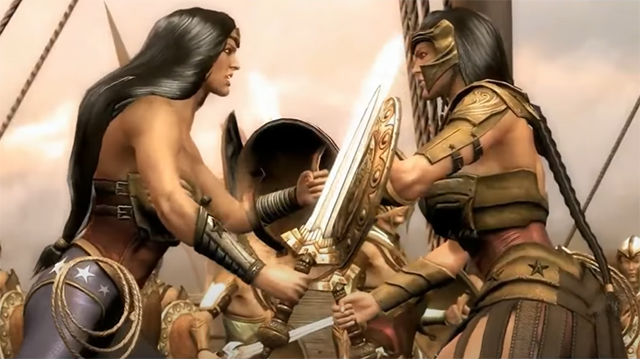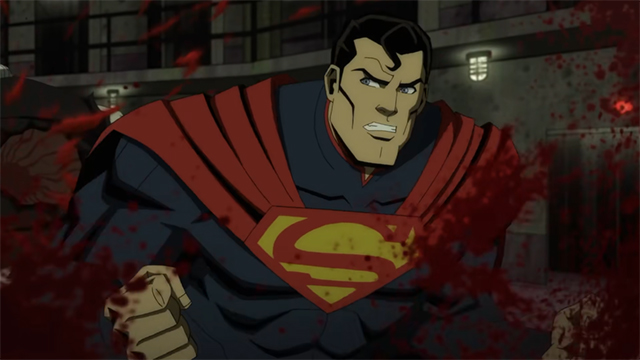The Injustice animated film doesn’t pull its punches. It almost literally begins with a powerful one as Superman punches a hole through Joker as blood spurts everywhere. But it also kills off a ton of other DC Comics icons, too, and with blood not seen in the game.
ComingSoon Senior Gaming Editor Michael Leri recently interviewed Producer Rick Morales about the decision to kill those heroes, go for the R rating, the relative lack of multiverse-related story beats, and more. This interview contains spoilers for the film.
Michael Leri: The broad strokes of the movie are similar to the game, but the movie takes more of its time with Superman in the beginning. It shows him finding out about the baby and bonding with Lois. It’s short but more than the game gives. Why did you want to give a more sympathetic intro to the film?
Rick Morales: It centers on his downfall and so we had to build you up before we knocked you down. Seeing that happiness and joy and his life with Lois let us set up that he had something really great there and then we took it away from him in the most horrific way possible. I thought it was important to let the audience see that.
All that stuff is all rooted in the game, which is a gut punch, too, but we have the ability to expand on certain things in this so we wanted to make sure we took those opportunities. A big part of my outlook on this film was to make the choices that Superman was making throughout feel like they were motivated and things the characters would actually do. He still believes he’s good.

The multiverse aspect is a huge part of the game. There are almost always two versions of every character fighting around. That is more or less completely gone from the film, which seems like a big choice. Can you walk me through why you decided to go that route?
There is a lot of ground to cover in this film. It’s an expansive story even in the video game, but then also this film in particular is based on the Tom Taylor comics in a large way. And that covered five years of material; it was just a ton of stuff to go through. So when we were looking through what the key moments were and what we had to bring to the screen, we saw some opportunity in that.
Tom Taylor gave us such a good roadmap with the comic book. Ernie Altbacker, our writer, went through that stuff and distilled it down into a full feature. There was a lot of ground to cover and we just hit on the key moments that really get there and tell the story of Superman and why something like this would cause him to take these options.
But bringing in the alternate reality stuff at the end, it opens up the world. And we do set it up with Mr. Terrific and say he’s investigating the multiverse. It’s a nod to the video game and all of the alternate realities.
The games are also rated T while the movie is rated R and significantly more bloody. Can you speak to that choice? Did it have anything to do with making two Mortal Kombat movies and having those not satisfy your bloodlust?
[laughs] That is possible. I think that there is part of that that’s true. Not my bloodlust, but it’s based off a NetherRealm game. I look at it as a sister project to my Mortal Kombat stuff in a way. There are such violent things that happen in this film that I didn’t want to pull punches that I think have to be there.
Then at the same time, you’ll notice that if you watch the Mortal Kombat films, we take it a lot further than we do here and have fun with it. Some of those are played as gags and meant for laughs like someone’s head exploding or someone’s eye popping out. It’s stuff like that that we wouldn’t do in this film because it’s tonally different.
RELATED: Mortal Kombat Legends Creators Explain the Fan-Driven Memey Cameo
It wouldn’t feel right to have Superman revel in that carnage. But I think you do have to see Superman punching a hole through Joker’s chest. It’s such a visceral thing. It’s such a shocking act for Superman to commit that I think that an R rating is totally appropriate for the film.

And building off that, can you explain why you felt it was important to murder so many superheroes and villains?
I am very much a traditionalist when it comes to these characters. The idea of slaughtering half of them is not something that I necessarily get joy out of. I don’t say, “Yeah, I want to do Injustice because I get to kill this guy and I get to kill that guy.” That’s not how I think about it. To me, the reason that I wanted to do this movie and the reason that I wanted to bring in the director, Matt Peters, was because I know what a huge Superman fan he is and how much love he has for that character. And I feel the same.
RELATED: Injustice Interview: Anson Mount on Putting His Own Spin on Batman
So I thought it was necessary to have somebody that is going to be protective of Superman in a way so we’re not just making him an over-the-top villain and we’re measured in the fall that he takes. Nightwing is one of my favorite characters ever so killing him off was not something that I took joy in but it is something that moves that story along further and is a necessary death. It was making sure that all of these deaths have weight to them when they happen so it wasn’t just having another one gone that you didn’t care about.
Superman does get smacked around a bit. But at the end, he gets willingly submits rather and doesn’t get beaten into submission. In the game, he is only taken in after getting physically beaten. How did that change come about and why is that important?
To me, it felt true to that character. As far gone as Superman is, I do think, and this the hopeful side of me and why I like a character like Superman, there is a point when confronted with all the chaos, carnage, and death, he’d have to look around and ask himself if he really made things better.
And when he’s confronted with Lois right there, albeit an alternate reality Lois, and he’s seeing what he could have had and what the catalyst was for all of this, did he do her justice? That felt more emotionally resonant to have him break down and understand everything that he’d done and realize that he was the bad guy.










